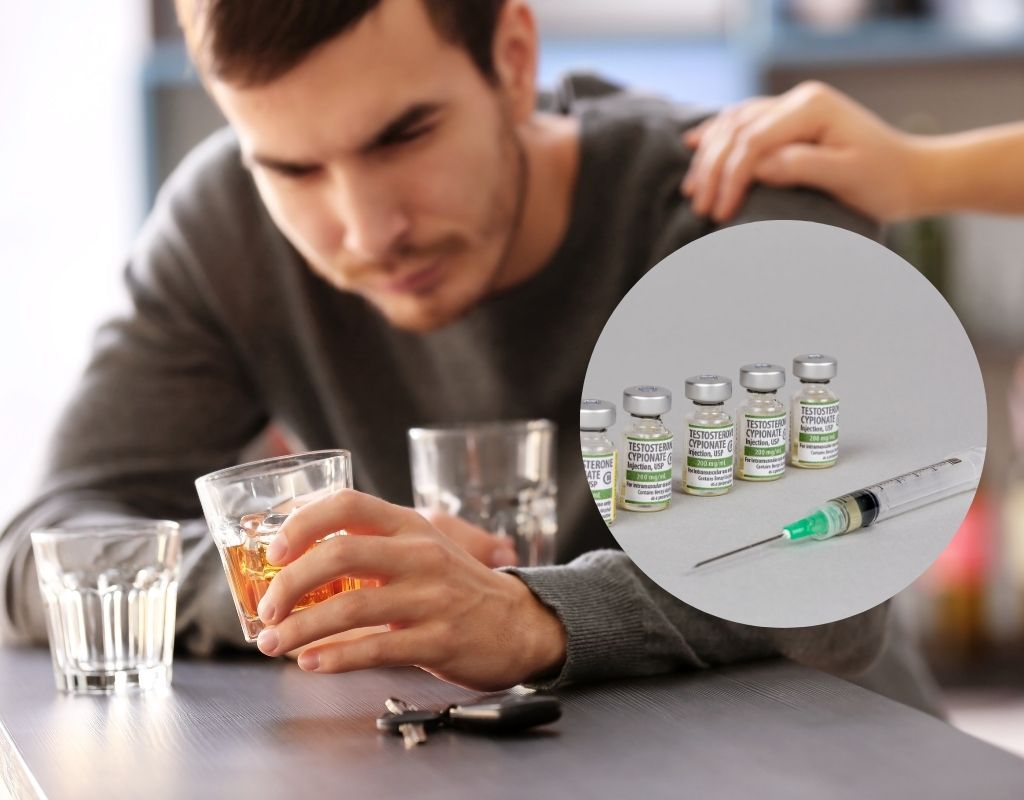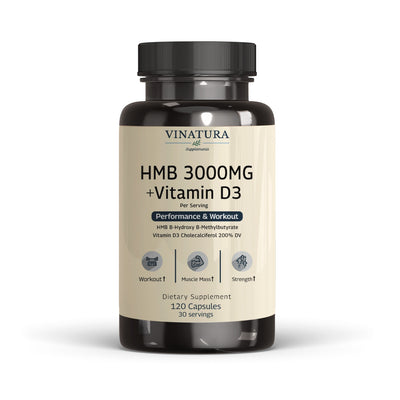
Can I Drink Alcohol While Taking Testosterone Injections?
Testosterone Replacement Therapy (TRT) is a treatment that helps men boost testosterone levels when their body doesn’t produce enough, improving health, sexual function, and quality of life.
However, many people wonder, “Is it okay to drink alcohol while on testosterone injections?” This is an important question because alcohol can affect the liver, hormone balance, and the long-term success of the treatment. This article provides clear and detailed information to answer this question.
Before exploring further, please read the disclaimer located at the end of this webpage.
Key Takeaways
- Both alcohol and testosterone are processed by the liver, so drinking during TRT adds extra strain on liver function.
- Alcohol lowers natural testosterone levels, potentially reducing the overall effectiveness of TRT.
- Alcohol consumption is linked to a 1.22 times higher risk of needing a prostate biopsy.
- Alcohol increases cortisol, a stress hormone that causes fatigue and counteracts TRT benefits.
- Moderate drinking (1–2 drinks occasionally) is advised to minimize health risks while on TRT.
Understanding the Effects of Alcohol on Testosterone
Alcohol has a clear impact on testosterone levels in men. Regular drinking tends to lower testosterone while increasing estrogen, leading to a hormone imbalance.
This can cause problems like erectile dysfunction, belly fat gain, and loss of lean muscle. Studies show that in chronic heavy drinkers, alcohol can reduce testosterone by 19% to 27%, depending on the amount consumed, though this may reverse if drinking stops [6].
Alcohol is also considered a key lifestyle factor that lowers testosterone levels in the blood [3]. Low testosterone can lead to increased body fat and reduced muscle mass [4, 5], raising the risk of sexual dysfunction, especially erectile dysfunction (ED) [8, 11].
Beyond physical effects, heavy drinking impacts mental health and sleep, which can worsen testosterone deficiency.
Low testosterone is linked to psychological issues like depression, anxiety, memory problems, and insomnia [8].
In older men, low testosterone tied to andropause (male menopause) also includes emotional and cognitive issues [6]. Alcohol, known to worsen the decline in male hormones, can harm mental health and sleep, further lowering testosterone (Isidori & Lenzi, 2007).

Alcohol and Testosterone Replacement Therapy (TRT)
Another concern is that alcohol can reduce the effectiveness of TRT. Alcohol boosts the activity of an enzyme called aromatase, which converts testosterone into estrogen.
In men with higher body fat, increased aromatase activity leads to higher estrogen levels, which can disrupt the brain’s regulation of testosterone production, lowering circulating testosterone [3].
Even during TRT, regular drinking may limit the therapy’s benefits because the added testosterone can be converted into estrogen [6].
In short, alcohol directly lowers testosterone, affects mental health and sleep, and may interfere with TRT’s effectiveness through hormone conversion. These effects make drinking a key factor to consider for anyone looking to maintain or improve testosterone levels.
Can I Drink Alcohol While Taking Testosterone Injections?
It’s best to avoid alcohol while on testosterone injections because it can lower hormone levels and stress the liver, the organ that processes testosterone [3, 5].
This not only reduces the treatment’s effectiveness but may also harm the testicles [7, 10]. If you’re on TRT, limit alcohol and talk to your doctor to avoid risks. These risks are explored further in the next section.
Risks of Drinking Alcohol While on TRT
One of the biggest risks of drinking alcohol during TRT is the strain on the liver. Both alcohol and testosterone are processed by the liver, so using them together increases the liver’s workload.
While modern testosterone forms are less toxic to the liver than older oral versions [2, 4], risks remain. This is especially important because testosterone is partly broken down by the liver (Çatakoğlu, 2017).
Combining alcohol with testosterone forces the liver to work harder, which could affect its long-term function.
Alcohol also directly affects hormone levels. Studies show that excessive drinking is linked to lower natural testosterone levels [5]. This means alcohol can reduce TRT’s effectiveness, as the therapy aims to make up for low testosterone.
Evidence also suggests that drinking increases the chance of needing a prostate biopsy during TRT due to elevated PSA levels.
One study found that 61.1% of patients who needed a prostate biopsy drank alcohol, compared to 32.3% in the group that didn’t need one, and the risk of prostate cancer also rose with higher alcohol consumption [9].
Another factor is that alcohol raises stress hormones like cortisol. High cortisol levels over time can cause fatigue, exhaustion, and slower recovery (Adinoff et al., 2003).
This goes against TRT’s goal of boosting energy, mood, and vitality [8]. When cortisol stays high, it can limit the benefits of testosterone therapy and lower quality of life.
In summary, drinking alcohol during testosterone injections carries risks to the liver, hormones, and overall health. However, in some unavoidable situations, you can minimize harm by drinking responsibly. The next section offers tips for safer alcohol use during TRT.
How to Drink Alcohol Responsibly While Undergoing TRT

Drink in moderation: Limit yourself to 1–2 drinks on special occasions, and avoid daily drinking to reduce negative effects on hormones and the liver.
Choose the right type of alcohol: Opt for dry red wine or clear spirits (vodka, gin, etc.) instead of heavy beers or sugary cocktails, as they are easier on the liver.
Stay hydrated: Always drink plenty of water alongside alcohol to support liver detoxification.
Avoid drinking near your TRT injection time: This helps prevent disruption of the treatment’s effectiveness.
Maintain a healthy diet: Focus on vegetables, fruits, and fresh foods, while limiting processed foods to minimize the combined impact of alcohol and medication.
Adopt a balanced lifestyle: Exercise regularly, manage stress, and seek counseling if needed to keep hormones stable and improve overall quality of life.
Real-world experiences echo this advice. For example, a Reddit user shared that moderate intake (about two drinks a day) only has a slight effect on testosterone. More noticeable issues occur with regular heavy drinking, which brings greater health risks than just low testosterone. He added: “If you’re not binge drinking regularly, you shouldn’t see much difference.”*
However, these are only suggestions based on user opinions and some research. Everyone reacts differently to alcohol, so to ensure you stick to your therapy, consult your doctor before drinking during TRT.
Frequently Asked Questions
1. What to Avoid While Taking Testosterone Injections?
TRT is not recommended for patients with uncontrolled heart failure, untreated severe sleep apnea, a recent heart attack or stroke within the past six months, blood clotting disorders, or those planning to have children soon [2].
Heavy drinking should also be limited, as it increases the risk of requiring a prostate biopsy if PSA levels rise during TRT [9].
2. Does Alcohol Affect Hormone Injections?
Studies show that alcohol can impact testosterone function in chronic heavy drinkers [6]. Alcohol is also known to increase ACTH, a hormone tied to cortisol production (the stress hormone), in rats.
Corticosterone (another stress hormone) was also noted during alcohol consumption and withdrawal in rats [1]. While these are animal studies, they suggest alcohol can affect hormones in general.
Conclusion
Alcohol consumption during testosterone therapy may affect liver function, reduce treatment effectiveness, and contribute to certain health risks.
In limited social settings, moderate intake may be tolerated if overall health is maintained and medical guidance is followed. It is important to monitor your condition closely and consult your healthcare provider for personalized advice. For further insights, refer to reliable medical sources on TRT and lifestyle management.
Testimonial Disclaimer
*The testimonials presented on this website are provided by individuals based on their personal experiences with our products. These testimonials represent individual opinions and experiences, which may not be typical or applicable to all users of our products. Results may vary depending on a variety of factors, including individual health, lifestyle, and adherence to product usage instructions.References
- [1] Adinoff, B., Ruether, K., Krebaum, S., Iranmanesh, A., & Williams, M. J. (2003). Increased salivary cortisol concentrations during chronic alcohol intoxication in a naturalistic clinical sample of men. Alcoholism, Clinical and Experimental Research, 27(9), 1420–1427. https://doi.org/10.1097/01.ALC.0000087581.13912.64
- [2] Anderson, D. J., Vazirnia, P., Loehr, C., Sternfels, W., Hasoon, J., Viswanath, O., Kaye, A. D., & Urits, I. (2022). Testosterone Replacement Therapy in the Treatment of Depression. Health Psychology Research, 10(4). https://doi.org/10.52965/001c.38956
- [3] Çatakoğlu, A. B. (2017). Testosterone Replacement Therapy and Cardiovascular Events. Turk Kardiyoloji Dernegi Arsivi-Archives of the Turkish Society of Cardiology. https://doi.org/10.5543/tkda.2017.00531
- [4] Hargreave, T. (2004). Hormonal Replacement Therapy for Aging Men? The Debate Goes On. European Urology, 46(2), 155–161. https://doi.org/10.1016/j.eururo.2004.04.003
- [5] Isidori, A. M., & Lenzi, A. (2007). Testosterone Replacement Therapy: What We Know Is Not Yet Enough. Mayo Clinic Proceedings, 82(1), 11–13. https://doi.org/10.4065/82.1.11
- [6] Lund, B., Bever-Stille, K., & Perry, P. (1999). Testosterone and Andropause: The Feasibility of Testosterone Replacement Therapy in Elderly Men. https://jeffreydachmd.com/wp-content/uploads/2019/02/Testosterone-and-andropause-feasibility-of-testosterone-therapy-in-elderly-men-Lund-Brian-J-Human-Pharm-and-Drug-Ther-1999.pdf
- [7] Matza, A. R. (2009). The Boston “T” party: Masculinity, testosterone therapy, and embodiment among aging men and transgender men. ProQuest. https://www.proquest.com/openview/261493ccda044e5a0b6ce9e547a5e06b/1.pdf?pq-origsite=gscholar&cbl=18750
- [8] Park, M., Yeo, J., Park, S., Na, W., & Moon, D. (2019). Predictive Factors of Efficacy Maintenance after Testosterone Treatment Cessation. Journal of Clinical Medicine, 8(2), 151. https://doi.org/10.3390/jcm8020151
- [9] Ryu, C. H., Park, S. G., Yeo, J. K., & Park, M. G. (2022). Predictive factors for elevated prostate specific antigen and hematocrit levels during testosterone replacement therapy in patients with testosterone deficiency. Journal of Men’s Health, 18(4), 99. https://doi.org/10.31083/j.jomh1804099
- [10] Sinclair, M., Gow, P. J., Grossmann, M., Shannon, A., Hoermann, R., & Angus, P. W. (2016). Low serum testosterone is associated with adverse outcome in men with cirrhosis independent of the model for end-stage liver disease score. Liver Transplantation, 22(11), 1482–1490. https://doi.org/10.1002/lt.24607
- [11] Narukawa, T., Soh, J., Kanemitsu, N., Harikai, S., Fujihara, A., & Ukimura, O. (2021). Efficacy of testosterone replacement therapy plus alternate-day tadalafil for patients with late-onset hypogonadism: An open-label, randomized, crossover study. International Journal of Urology : Official Journal of the Japanese Urological Association, 28(4), 376–381. https://doi.org/10.1111/iju.14468
Author

Product Disclaimer
Including an ingredient or study does not evaluate, endorse, or recommend any Vinatura product or any third-party product. Some ingredients discussed may not be used in any Vinatura product.
The content of the articles has not been evaluated by the Food and Drug Administration (FDA) and is not intended to promote or endorse any specific product. Any products sold on this website are not intended to diagnose, treat, cure, or prevent any disease.
Opinions and Endorsements
Any claims, statements, or opinions expressed in the articles are those of the author(s) and do not necessarily reflect the views or opinions of the manufacturers of the dietary supplement products. The products sold on this website are separate from the content of the articles and are not directly endorsed or associated with the information presented here.
Liability Disclaimer
The author(s) of the articles, website, and manufacturers of the dietary supplement products do not assume any liability for any potential consequences arising from the use of the information provided in the articles. Ingredient effects, dosages, and safety vary by individual, formulation, and context; some ingredients interact with medications or may be unsuitable during pregnancy or lactation. It is recommended that individuals consult with a qualified healthcare professional before making any dietary or lifestyle changes, including the use of dietary supplements.
Product Usage
Please refer to the product labels and packaging for specific usage instructions and guidelines for the dietary supplement products sold on this website.
Customer Support
For any concerns or questions regarding the dietary supplement products, please contact our customer support team, who will be more than happy to assist you.






Leave a Comment
Be the first to comment.
What do you think?